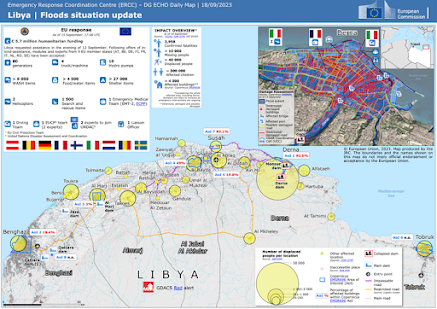Libya's Battle Against Floods//itespurrom.com/4/6504286
Presentation
Libya, a North African country known for its huge desert scenes and old history, has as of late confronted a startling and testing cataclysmic event: floods. In a district where water shortage is much of the time the essential concern, these floods have shocked quite a large number. In this blog entry, we will investigate the causes and results of the floods in Libya, as well as the endeavors being had to moderate their effect and construct flexibility notwithstanding future floods.
The Reasons for Flooding
Libya's new flooding can be ascribed to a few elements, including sporadic weather conditions, lacking foundation, and deforestation. Here are a few key variables adding to the floods:
Sporadic Weather conditions: Environmental change has brought about capricious weather conditions around the world. In Libya, this has prompted both extreme dry spells and abrupt weighty precipitation. The absence of steady precipitation has left the dirt less ready to ingest water, making it more inclined to flooding when downpours do come.
Insufficient Waste Framework: Libya's urban communities and towns frequently need appropriate seepage frameworks to deal with weighty precipitation. The shortfall of all around planned sewers and waste waterways fuels flooding in metropolitan regions.
Deforestation: The expulsion of trees and vegetation from Libya's scene has diminished the dirt's capacity to assimilate water. This has brought about expanded spillover during weighty downpours, adding to flooding in weak regions.
The Results of Flooding
The results of flooding in Libya are broad and pulverizing. They include:
Death toll and Property: Floods have asserted resides and harmed homes, leaving numerous Libyans without sanctuary and fundamental assets.
Relocation: Families have been driven away from their homes and look for asylum in brief sanctuaries, expanding the weight on currently stressed philanthropic associations.
Framework Harm: Streets, spans, and other basic foundation have been harmed or washed away, hampering admittance to impacted regions and blocking recuperation endeavors.
Monetary Effect: Flooding upsets monetary exercises, influencing horticulture, transportation, and organizations, and causing monetary stress on networks and the country in general.
Alleviation and Strength Building:The Libyan government and worldwide associations are cooperating to moderate the effect of floods and fabricate flexibility in weak networks. Here are a portion of the means being taken:
Further developed Framework: Endeavors are in progress to create and update seepage frameworks in metropolitan regions, guaranteeing better flood the executives during weighty downpours.
Reforestation: Drives to establish more trees and reestablish vegetation mean to build the dirt's capacity to assimilate water, diminishing overflow and the gamble of flooding.
Early Admonition Frameworks: High level determining and early admonition frameworks assist with making networks aware of looming floods, giving them an opportunity to plan and clear if fundamental.
Training and Mindfulness: Teaching the general population about flood gambles and advancing familiarity with wellbeing measures is critical in building flexibility at the local area level.
CONCLUSION
Libya's new encounters with floods act as a distinct wake up call of the developing difficulties presented by environmental change and the requirement for proactive measures to safeguard weak networks. While floods might keep on testing the strength of Libyan culture, the endeavors to relieve their effect and adjust to changing circumstances are empowering indications of progress. Through reasonable turn of events, further developed foundation, and local area commitment, Libya can construct a more splendid, stronger future notwithstanding these normal difficulties.



No comments:
Post a Comment